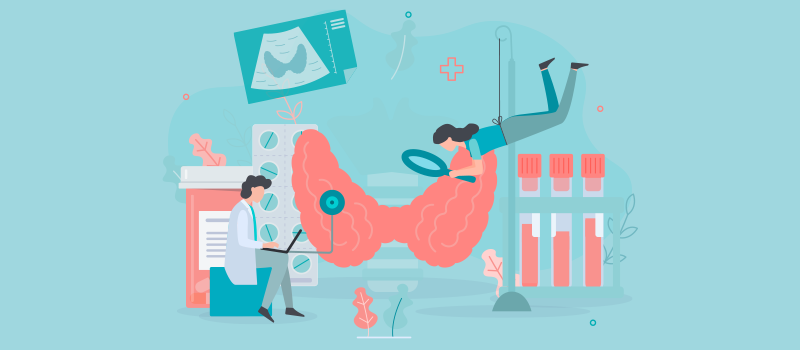What’s the Buzz
The Bee Healthy Blog
Thyroid Nodules: When To Be Concerned

Thyroid nodules are quite common and are usually benign. However, a small number of thyroid nodules can be cancerous. Please continue reading to find out when to worry about thyroid nodules.
What causes nodules in the thyroid gland?
The thyroid is a small butterfly-shaped gland located in the neck. It makes thyroid hormones which control many important functions in the body, such as metabolism, brain development, heart and muscle function, and maintenance of bones. Nodules (growths or lumps of abnormal tissue) can develop in the thyroid gland for various reasons, such as:
Thyroid adenomas
These are benign growths of normal thyroid tissue. They are solid nodules that are harmless unless they become large in size and cause compressive symptoms. Some larger nodules can lead to increased thyroid hormone levels and symptoms of hyperthyroidism (overactive thyroid gland).
Thyroid cysts
Thyroid adenomas can degenerate and form fluid-filled sacs called thyroid cysts. These cystic nodules may have some solid components. They are usually benign but can occasionally contain cancerous cells.
Hashimoto’s thyroiditis
This autoimmune condition is a type of chronic thyroid inflammation that results in enlarged thyroid nodules and hypothyroidism (underactive thyroid gland).
Multinodular goiter
Goiter is an enlargement of the thyroid gland due to an iodine deficiency. It is uncommon in the United States because table salt and other foods contain added iodine. Multinodular goiter is a type of enlarged thyroid gland in which there are multiple nodules. The cause is unclear.
Thyroid cancer
The chance of a thyroid nodule being thyroid cancer is low. However, some thyroid nodules contain cancerous cells.
What are thyroid nodule symptoms?
Many thyroid nodules do not cause any symptoms. They are discovered incidentally on a routine medical exam by a primary care doctor or on imaging tests for other health conditions. Both men and women can develop thyroid nodules, but they are more common in women.
Sometimes, thyroid nodules can become large enough to be felt or seen as swelling in the neck. They can also press upon the trachea (windpipe) and cause problems with breathing and difficulty swallowing.
Some thyroid nodules secrete excess thyroid hormone. Too much thyroid hormone can cause symptoms of hyperthyroidism, such as a pounding or irregular heartbeat, tremors, nervousness, increased sweating, heat intolerance, trouble sleeping, and unexplained weight loss.
Other symptoms of thyroid disease (hypothyroidism or underactive thyroid gland) can include cold sensitivity, fatigue, dry skin, muscle weakness, constipation, memory problems, depression, and unexplained weight gain.
Can thyroid nodules become thyroid cancer?
Most thyroid nodules are benign nodules. However, some can be cancerous thyroid nodules. If a nodule contains cancer cells, it can grow and invade nearby tissues and metastasize (spread) to the lymph nodes in the neck. Sometimes the cancer cells can spread beyond the neck to other parts of the body, such as the lungs and bones. Risk factors for thyroid cancer include a family history of thyroid cancer and radiation exposure to the neck.
Only a healthcare provider can make a diagnosis of what type of thyroid disease you have, including benign thyroid nodules versus thyroid cancer. Even if it is thyroid cancer, fortunately, this type of cancer is usually very treatable with surgery and, if indicated, radioactive iodine therapy.
When should you worry about thyroid nodules?
According to the American Thyroid Association, most nodules in the thyroid gland are benign, and you don't need to worry about them. However, all nodules should be evaluated because some nodules may contain cancerous cells.
Notably, thyroid cancer can remain silent for a long time, with the only sign being the presence of a thyroid nodule. That’s why it’s important to evaluate thyroid nodules. If it turns out to be thyroid cancer, the earlier it is diagnosed and treated, the more successful the outcome.
As mentioned above, large nodules are often responsible for causing symptoms such as difficulty breathing and swallowing. Some nodules secrete excess thyroid hormone, causing symptoms of an overactive thyroid gland. Therefore, if you have symptoms that could be from thyroid conditions, do not delay seeking medical care. You could have a benign condition that can easily be treated with medication to normalize thyroid levels.
What size thyroid nodules are worrisome?
You cannot tell if a thyroid nodule is worrisome for thyroid cancer based on size alone. Studies do suggest that the chances of malignancy are higher in larger nodules. A threshold has been detected at 2 cm, where the cancer risk seems to be the highest.
Generally speaking, if the nodule is large, firm, fixed, rapidly growing, or painful, there is a chance it could be thyroid cancer. However, you cannot tell the difference between benign thyroid nodules and cancerous thyroid nodules based on symptoms or size alone. If you have any symptoms, make an appointment to see your healthcare provider.
How can a doctor tell if a thyroid nodule is cancerous?
A doctor can tell if a thyroid nodule is cancerous based on a physical examination, thyroid function tests to measure thyroid hormone levels, ultrasound imaging, fine-needle aspiration biopsy to remove a sample of thyroid cells for examination in the laboratory, and a thyroid scan using radioactive iodine.
What is the treatment for thyroid nodules?
Many thyroid nodules do not require any treatment. If the biopsy shows benign nodules, your healthcare provider may recommend watchful waiting with periodic thyroid function tests and ultrasound scans to keep an eye on them. A large nodule may need to be surgically removed if it is causing compressive symptoms.
If you have hypothyroidism (underactive thyroid gland), your doctor may prescribe medications for thyroid hormone replacement. If the thyroid nodules are causing elevated thyroid hormone levels and hyperthyroidism, your doctor may prescribe anti-thyroid medications, radioactive iodine therapy, or surgery as treatment options.
If the thyroid nodules are cancerous, doctors occasionally recommend watchful waiting if they are slow growing. However, most thyroid nodules that are cancerous are treated with surgery. Another option is alcohol ablation (destruction of the nodule by injecting alcohol).
Wrapping up, you do not need to worry about thyroid nodules because many nodules are benign. However, some can be cancerous, which is why you should seek treatment without delay if you have any symptoms.
References:












SOCIAL